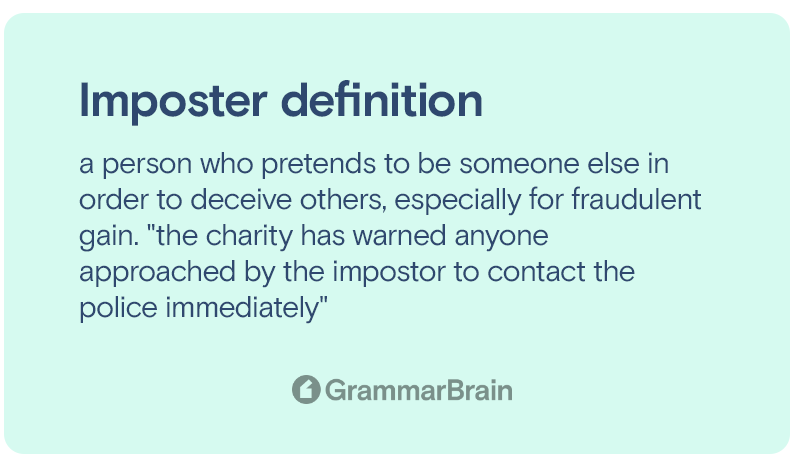Is it imposter or imposter? You might have experienced the confusion of reading through an article and doubling back to certain spellings. While Grammarly doesn’t think “Imposter” is wrong, you might have felt like the word “Imposter” looks weirder the longer you stare at it.
Don’t worry, your brain is fine. The “real” spelling of the word is “Impostor”. But despite the confusing loop it throws us in, “Imposter”, isn’t actually an impostor! So, why do people use two versions of the same word? And where does it come from? Keep reading to find out!
| Word | Definition |
| Imposter | a person who pretends to be someone else in order to deceive others, especially for fraudulent gain. “the charity has warned anyone approached by the impostor to contact the police immediately” |
| Impostor | Incorrect spelling of imposter |
What is the Difference Between Impostor and Imposter?
As mentioned above, the real spelling of the word is “Impostor.” You can try to remember this by thinking of “Impersonator”, which also ends with -or. Although “Imposter” is not wrong, it is far less used. Both variations are used in articles, but “impostor” is the true spelling and is more common.
It is safer to go with “Impostor”, as it is the version of the word that is used in guides and dictionaries. Despite this, many American, as well as British news channels and publications, make use of the variation “Imposter”. This might be confusing, but remember that both spellings are technically correct.
There is no actual difference between the words. They both mean the same thing, but it is recommended to use “Impostor”. Although the real spelling is “Impostor”, in countries like Australia and New Zealand, the alternate spelling of “Imposter” is surprisingly more in use!

Meaning
Merriam-Webster defines the word “Impostor” as someone who takes on a fake identity for some deceptive reason. It is a noun, and the Cambridge dictionary mentions that an “Impostor” is someone who pretends to be another person. This fraudulence is usually for some negative reason.
If you search for “Imposter” and its meaning on the internet, your browser will redirect you to these very same pages. Essentially, both “Impostor” and “Imposter” represent the same meaning. They are two different ways in which you can write the same word.
Synonyms of “Imposter” or “Impostor” are words like fake, phony, or fraud.
Origins
Both the variations of the word – “impostor” and “imposter”, have been in use for many years. Next time you think you’ve made a typo with “Imposter”, don’t worry. Both the spellings are correct.
The etymology of the word “Impostor” (or “Imposter”) begins from the French word “imposteur“. The French version was descended from the Latin word “impostor” and an even earlier version of the word in Latin – “imponere“. The Latin version – “impostor” began to be used in the English language in the 16th century. The spelling of the word has not changed even now.
Sentence Examples
Now that we know Impostor and Imposter both mean the same thing, let’s see how the word appears in sentences:
- “While playing the online game Among Us, the aim is to detect the impostor hiding between us”
- “This is not my husband! He is clearly an impostor! She cried.”
- “He had to pretend to be an imposter to survive in the dangerous games”
Conclusion
Now you know the meaning and use of the word “Impostor” and “Imposter.” So go ahead and use them to your heart’s content! And don’t worry if you see an “Imposter” in a sentence. Now you know it’s not wrong.
Inside this article
Fact checked:
Content is rigorously reviewed by a team of qualified and experienced fact checkers. Fact checkers review articles for factual accuracy, relevance, and timeliness. Learn more.
Core lessons
Glossary
- Abstract Noun
- Accusative Case
- Anecdote
- Antonym
- Active Sentence
- Adverb
- Adjective
- Allegory
- Alliteration
- Adjective Clause
- Adjective Phrase
- Ampersand
- Anastrophe
- Adverbial Clause
- Appositive Phrase
- Clause
- Compound Adjective
- Complex Sentence
- Compound Words
- Compound Predicate
- Common Noun
- Comparative Adjective
- Comparative and Superlative
- Compound Noun
- Compound Subject
- Compound Sentence
- Copular Verb
- Collective Noun
- Colloquialism
- Conciseness
- Consonance
- Conditional
- Concrete Noun
- Conjunction
- Conjugation
- Conditional Sentence
- Comma Splice
- Correlative Conjunction
- Coordinating Conjunction
- Coordinate Adjective
- Cumulative Adjective
- Dative Case
- Determiner
- Declarative Sentence
- Declarative Statement
- Direct Object Pronoun
- Direct Object
- Diction
- Diphthong
- Dangling Modifier
- Demonstrative Pronoun
- Demonstrative Adjective
- Direct Characterization
- Definite Article
- Doublespeak
- False Dilemma Fallacy
- Future Perfect Progressive
- Future Simple
- Future Perfect Continuous
- Future Perfect
- First Conditional
- Irregular Adjective
- Irregular Verb
- Imperative Sentence
- Indefinite Article
- Intransitive Verb
- Introductory Phrase
- Indefinite Pronoun
- Indirect Characterization
- Interrogative Sentence
- Intensive Pronoun
- Inanimate Object
- Indefinite Tense
- Infinitive Phrase
- Interjection
- Intensifier
- Infinitive
- Indicative Mood
- Participle
- Parallelism
- Prepositional Phrase
- Past Simple Tense
- Past Continuous Tense
- Past Perfect Tense
- Past Progressive Tense
- Present Simple Tense
- Present Perfect Tense
- Personal Pronoun
- Personification
- Persuasive Writing
- Parallel Structure
- Phrasal Verb
- Predicate Adjective
- Predicate Nominative
- Phonetic Language
- Plural Noun
- Punctuation
- Punctuation Marks
- Preposition
- Preposition of Place
- Parts of Speech
- Possessive Adjective
- Possessive Determiner
- Possessive Case
- Possessive Noun
- Proper Adjective
- Proper Noun
- Present Participle
- Prefix
- Predicate



